
和平的力量周恩来思想对国家发展的深远启示
The Power of Peace: Zhou Enlai’s Thought
and Its Profound Inspiration for National Development
主讲人 / Speaker: 周晓芳·北 / Xiaofang Zhou North 11:00-11:20
上海论坛 / Shanghai Forum
日期 / Date: 2025年4月25日至27日/April 25-27, 2025
地点 / Location: 上海复旦大学智库楼1楼106 / No. 1 Think Tank Building, 106
尊敬的各位嘉宾,亲爱的朋友们,女士们、先生们:
Distinguished Guests, Dear Friends, Ladies and Gentlemen:
It is my great honor to join you today to reflect on a subject that remains timeless and vital for the future of our world: the role of peace in national development, as illuminated by the life of Premier Zhou Enlai.
In modern Chinese history, Zhou Enlai stands out, not only as a statesman and diplomat, but as a true practitioner of the philosophy of peace. His lifelong commitment to peace, his people-centered vision, and his dedication to cooperation continue to resonate across generations, offering us valuable guidance for the challenges we face today.
- Peace Is Not Only a Goal but the Foundation of Development
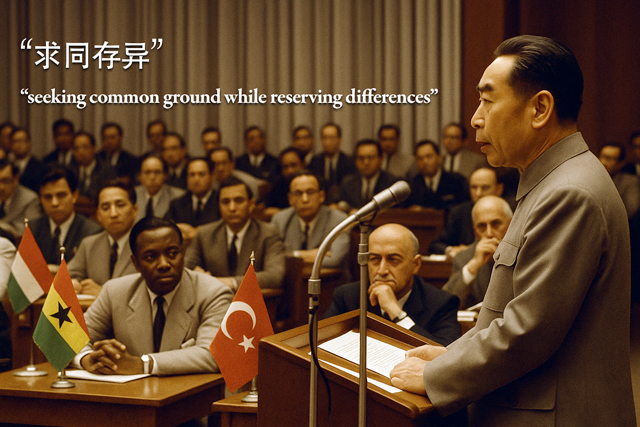
Premier Zhou Enlai consistently emphasized that peace is not merely a diplomatic commitment between nations; it is the essential condition for a nation to focus on its own construction, improve the well-being of its people, and unleash human creativity.
Peace creates stability; stability nurtures development; and development enhances the quality of life. This principle holds true across time and geography.
History has shown us repeatedly that conflict and war extract a heavy price — not only in resources but in lost futures. This is why Premier Zhou firmly advocated the Five Principles of Peaceful Coexistence: mutual respect for sovereignty and territorial integrity, mutual non-aggression, non-interference in internal affairs, equality and mutual benefit, and peaceful coexistence.
These principles are not mere policy statements; they reflected a profound attitude toward civilization itself.
一、和平不仅是目标,更是发展的基石
周恩来总理始终强调:和平不仅是国家间的相互承诺,更是一个国家能够专注于自身建设、改善民生、释放创造力的基本条件。和平创造稳定,稳定孕育发展,发展带来人民的福祉。这一逻辑,在任何时代、任何国家,都是不可违背的真理。
在历史上,无数冲突与战争让世界为之付出沉重代价。周恩来深知,战争消耗的不仅是资源,更是未来。正因为如此,他在国际关系中始终倡导以和平共处五项原则为指导——相互尊重主权和领土完整、互不侵犯、互不干涉内政、平等互利、和平共处。这不仅是外交政策的表达,更是一种深层次的文明态度。
二、以对话代替对抗:理性领导者的选择
- Dialogue Over Confrontation: The Choice of Wise Leadership
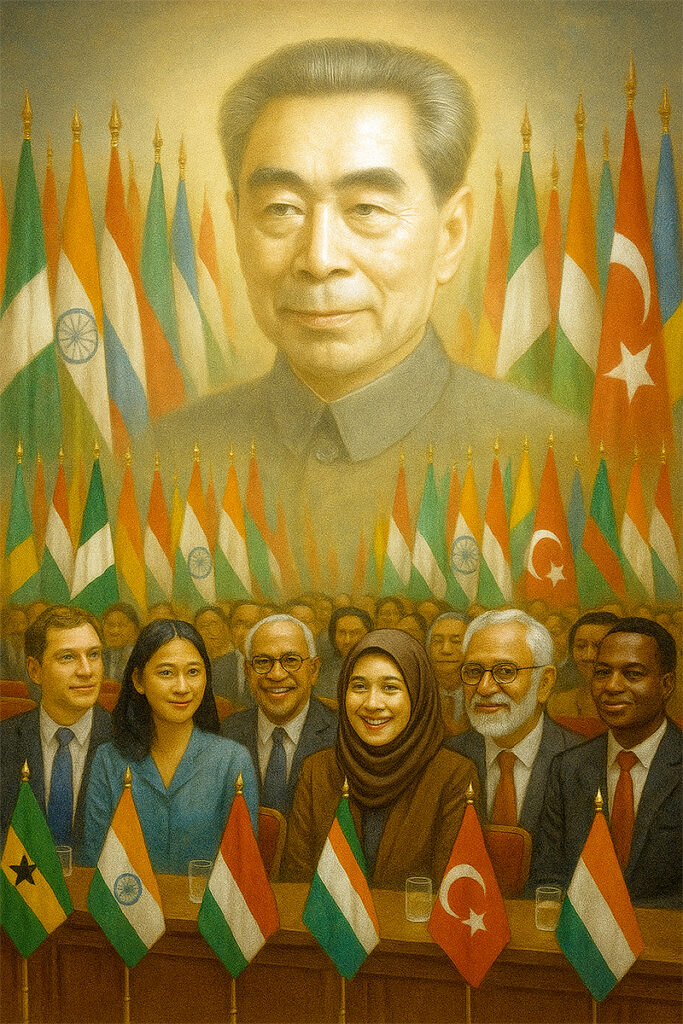
Amid complex and often tense international landscapes, Zhou Enlai demonstrated the wisdom of great leadership by consistently choosing dialogue over confrontation; patience over provocation. Whether at the Bandung Conference advocating “seeking common ground while reserving differences,” or in the long journey toward China-U.S. rapprochement, his approach was marked by tolerance, patience, and an unwavering belief in the possibility of peace.
This teaches us that responsible leadership is not driven by emotion or trapped in cycles of confrontation. Instead, it seeks solutions through reason, respect, and an expansive vision. Such an approach remains the wisdom most needed in our era.
Upholding Independence While Embracing Openness —
Shaping a Globally Engaged National Strategy
The Five Principles of Peaceful Coexistence (1954 Bandung Conference)
These principles laid the intellectual foundation for China’s later reform, opening-up, and active participation in global governance.
In today’s world of globalization and frequent conflicts of interest, maintaining a balance between independent development and open cooperation remains one of the key strategic wisdoms for China to continue engaging with the world while earning lasting respect.

Five Principles: Sovereignty, non-aggression, non-interference, mutual benefit, peaceful coexistence
Valuing Education and Talent, Integrating Science and Culture —
The Cornerstone of National Soft Power
During Premier Zhou’s visit to Fudan University in 1958, he advocated:
“Education must serve modernization, must be oriented toward the world, and must look to the future.”
He clearly understood that the true source of national competitiveness lies in talent and innovation.
He strongly advocated the integration of scientific research and teaching, and the co-development of culture and technology. This philosophy deeply influenced China’s later strategy: “Revitalizing the Nation through Science and Education.”
在极其复杂的国际环境中,周恩来展现了一位大国外交家的智慧:始终坚持用对话化解分歧,用耐心赢得信任。无论是万隆会议上的“求同存异”,还是中美关系破冰前夜的艰苦谈判,他都以极大的包容和耐性,维护了和平的可能性。
这一思想启示我们:真正有责任、有格局的国家领导者,不应被情绪左右,也不应为一时的对抗所困,而要以理性、以尊重、以广阔的视野去寻找解决问题的路径。这种以对话代替对抗的态度,正是我们这个时代最需要的智慧。
坚持独立自主,兼容并包——塑造开放型国家战略
和平共处五项原则(1954年万隆会议)
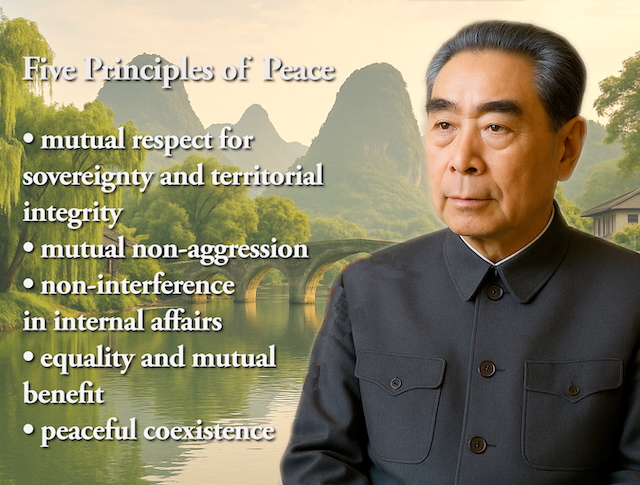
为中国当时赢得了国际尊重,也为后来中国的改革开放、积极参与全球治理打下了思想基石。
在全球化深度交织、利益冲突频仍的今天,坚持自主发展与开放合作并行不悖(bei),是中国继续走向世界、赢得尊重的重要战略智慧。
重视教育与人才,科技与文化并重——奠基国家软实力
1958年视察复旦大学,提出“教育要面向现代化,面向世界,面向未来”
总理深知,一个国家的真正竞争力,来自于人才与创新能力。
他主张科学研究与教学相结合,文化与科技共生,这直接影响了中国日后科教兴国战略的形成。
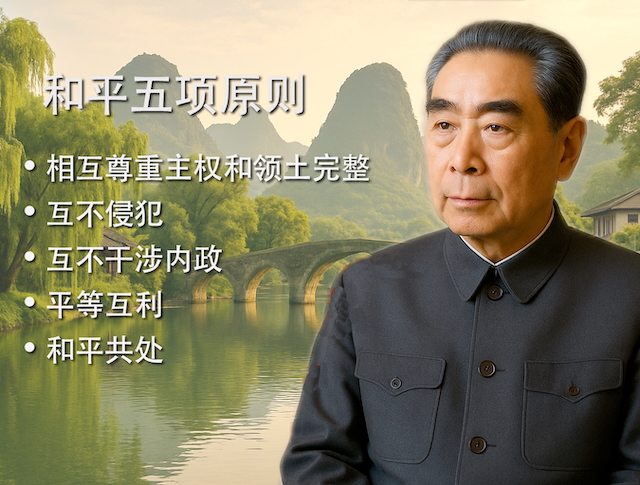
In today’s era of artificial intelligence, clean energy, biotechnology, and other emerging fields, this commitment to combining technological innovation with cultural confidence and ethical reflection continues to provide essential guidance—preventing the narrow mindset of “technology above all.”
Adhering to Pragmatism, Balancing Strategic Flexibility
with Steadfast Commitment — Toward Modern Governance Capacity
The Peaceful Resolution of the Xi’an Incident (1936)
In the face of highly dangerous and complex situations, Zhou Enlai employed wisdom and flexibility—turning confrontation into cooperation, which ultimately enabled the united front against Japanese aggression.
This demonstrated his skill in seeking win-win solutions, even under the most challenging conditions.
Today, when dealing with economic transformation, environmental pressures, and international competition, modern governance must avoid one-dimensional confrontation or passive retreat. Instead, Zhou’s principle of “seeking truth from facts” calls for adaptive strategies grounded in realism and long-term thinking.
Recognizing the Role of Family and Social Foundations —
Building Stability and Peace from the Ground Up
Premier Zhou’s Personal Integrity, Discipline, and
Emphasis on Moral Education within the Family.
Zhou Enlai once said:
“The family is the first school of life.”
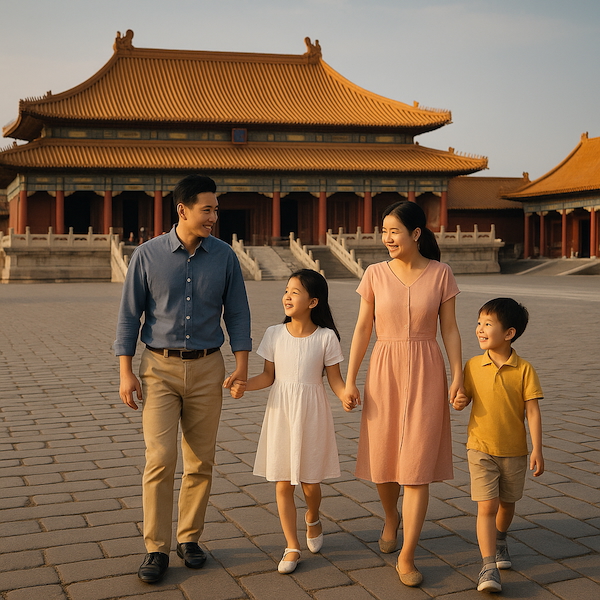
He practiced what he preached—not only showing great wisdom and resolve in diplomacy and state affairs, but also exercising strict self-discipline in his personal life, respecting boundaries between public and private roles, and valuing moral cultivation within the family.
Sustainable social stability and long-term national prosperity must begin with inner peace at the individual level. Respect for individuals, care for families, and the nurturing of harmonious social relationships are the very roots of soft power and societal resilience.
在AI、清洁能源、生物科技等新赛道上,继续发扬“科学与文化并进”的理念,推动科技创新的同时,保持文化自信与伦理反思,避免“唯技术论”的狭隘。
坚持实事求是,战略思维灵活而有定力——塑造治理能力现代化
西安事变的和平解决(1936年)
面对复杂险恶的局势,周恩来以柔克刚,化解内战危机,促成国共合作抗日。这展现了他在危机中寻找共赢方案的智慧。
面对经济转型、环境压力、国际博弈等不确定因素,国家治理不能简单对抗或回避,而应以“实事求是”为原则,灵活调整战略,坚持长期主义。
重视家庭与社会基础——和平从心出发,稳定从基层构建
总理个人生活严于律己,公私分明,家庭教育重视品格培养
他曾说:“家庭是人生的第一所学校。”
不仅在外交、国家战略上坚定睿智,在个人生活中也严以律己,重视修身齐家。
社会的稳定和国家的长远繁荣,需要从每一个人的心灵和平做起。尊重个体,关爱家庭,营造和谐的社会环境,是国家软实力与社会韧性的根基。
In one sentence, Premier Zhou’s life teaches us this profound truth:
“The true strength of a nation does not come from ruling others through fear, but from self-discipline, integrity, and the pursuit of peace and cooperation with the world.”
总结一句话:
周恩来以一生行动,告诉我们:
一个国家的真正强大,不是以恐惧支配他人,而是以修养自持、以信义立国、以和平合作赢得世界。
- Cooperation and Mutual Benefit: The True Engine of Development
Premier Zhou often reminded us that development is not the isolated pursuit of one nation but the shared aspiration of all humanity. In today’s world of intertwined economies, global supply chains, and cross-border innovation, this philosophy is more relevant than ever.
Zhou’s vision of cooperation is not merely transactional. It is about growing together on the basis of mutual respect and equality. Through such cooperation, technology can serve broader communities, economies can uplift wider populations, and culture can become a bridge rather than a barrier.
三、合作共赢:发展的真正动力
周恩来总理常说,“发展不是一个国家孤立的事业,而是人类共同的追求。”今天,当全球经济联系如此紧密,供应链彼此交织,科技创新跨越国界,这一理念显得尤为重要。
他所主张的合作,不是简单的交换利益,而是基于尊重与平等的共同成长。正是在这样的合作中,科技可以惠及更多人群,经济可以带动更广泛的福祉,文化可以成为桥梁而非壁垒。
- People-Centered Development: The Inner Foundation of Peace
Zhou Enlai often reminded us, “I study for the rise of China.” He deeply understood that peace, if it does not translate into tangible well-being for ordinary people, cannot be sustained. True peace is not merely an agreement between states — it is the lived experience of safety, dignity, and hope in every home and every life.
This insight teaches us that national development must be measured not only in economic terms but in education, innovation, social justice, and cultural flourishing. These are the true soil in which peace takes root.
四、以人民为中心:和平的内在根基
周恩来总理在幼年时就以“为中华之崛起而读书”自勉。他深知,和平如果不能转化为民众的幸福安康,便难以长久。真正的和平,不只是国家之间的契约,更是每一个家庭、每一个人的安全感、尊严感和希望感。
这也启示我们,国家发展不仅要有经济增长的数字,更要有教育的普及、科技的创新、社会的公平、文化的繁荣。这些,才是和平能够深植人心的土壤。
People-to-People Diplomacy:
A Vital Practice of Zhou Enlai’s Peace Philosophy
In the history of China’s modern diplomacy, Premier Zhou Enlai was not only a key architect of state-level peace efforts—he was also a visionary who deeply understood:
“Exchange between peoples must precede agreements between governments.”
He firmly believed:
“The foundation of relations between nations lies in the friendship between their peoples; and friendship between peoples comes from mutual understanding.”
As early as the 1950s, Premier Zhou actively promoted people-to-people channels such as cultural associations, artistic exchanges, and sports diplomacy to build bridges of human connection across political divides.
Notable examples include:
Hosting former Japanese Prime Minister Ichirō Hatoyama and other Japanese friends in China, promoting grassroots Sino-Japanese exchanges that laid the social foundation for the normalization of diplomatic relations between the two nations.
Inviting American journalist Edgar Snow to China, using his reporting to convey China’s vision of peace to the global audience.
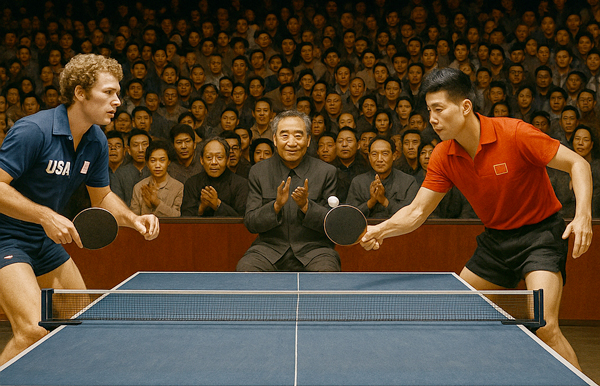
Supporting the historic “Ping-Pong Diplomacy,” where sports became a powerful tool for breaking the ice between China and the United States.
Through these initiatives, Zhou helped establish a lasting tradition of diplomacy rooted in the principle of “people first, politics second”—melting the ice with shared human experience before negotiating at the state level.
在中国现代外交史上,周恩来总理不仅是国家层面的和平缔造者,也是一位深刻理解**“人民之间的交流先于政府之间的协议”**的实践者。
他始终相信:“国之交在于民相亲,民相亲在于心相通。”
早在1950年代,周总理就多次推动中外友好协会、文化艺术交流、体育往来等民间渠道,搭建跨越政治隔阂的人文桥梁。
例如:
- 接待日本前首相鸠山一郎及友好人士访华,推动中日民间交流,为后来的中日邦交正常化奠定社会基础。
- 主动邀请美国记者埃德加·斯诺(Edgar Snow)访华,通过他向世界传递中国和平愿景。
- 支持“乒乓外交”,将体育赛事转化为外交破冰之举。
- 这些努力,构建了**“以民促官、以情感破坚冰”**的和平外交传统。
Contemporary Significance: Continuation and Innovation
In today’s deeply interconnected, multi-stakeholder global landscape, the significance of people-to-people diplomacy has grown stronger.
Particularly in complex bilateral relationships such as between China and the United States, official tensions can often be softened—and pathways for cooperation reopened—through civil society exchanges across many domains.
This modern expression of “people-to-people diplomacy” includes:
- Green technology collaboration between enterprises, generating shared value and mutual benefit;
- Academic partnerships between universities, nurturing a new generation of globally minded youth;
- NGO cooperation on humanitarian aid, environmental sustainability, and public health, building reservoirs of trust;
- Cross-cultural engagement through art, music, and sports, touching hearts where policies cannot.
- On global issues like artificial intelligence governance, climate change, and public health, such multi-dimensional, citizen-driven collaboration is not only beneficial—it is essential.
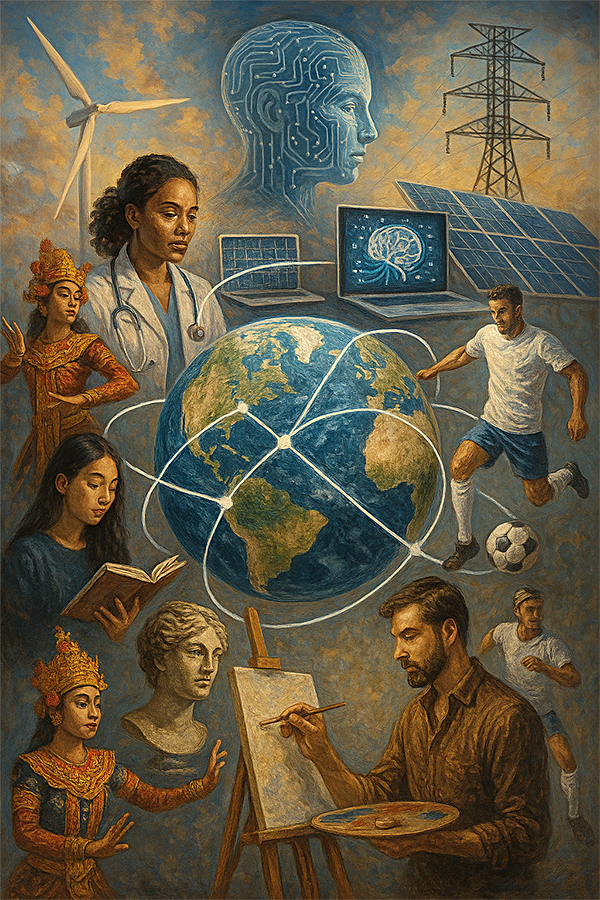
当代启示:延续与创新
在今天这个多元、全球深度互联的时代,民间交流的意义愈加重要。
尤其在中美关系等复杂的双边关系中,政府层面的紧张,往往可以通过学术、文化、青年、环保、科技、企业等多维民间对话去缓冲、去铺路
这就是“以民促官”的现代表达:
- 企业之间的绿色科技合作,创造共同利益;
- 大学之间的学术交流,培养青年一代的国际理解力;
- 非政府组织在人道援助、环保领域的跨国协作,积累信任资本;
- 艺术、音乐、体育跨文化交流,唤起人心的共鸣。
- 尤其在人工智能、气候变化、全球健康等全球性议题上,这种多元民间协作更显关键。
- 和平不仅在高层协议中诞生,也在一杯茶、一场展览、一封信的温度里生长。
Peace is not born solely at the level of high government negotiations; it grows quietly, often in the warmth of a shared cup of tea, an art exhibition, a letter, or a song.
Premier Zhou Enlai understood deeply that peace is not a gift bestowed by power—it is a resonance between human hearts.
Throughout his life, he practiced this wisdom of “people-first diplomacy,” always seeking ways for people to meet and understand each other, even when governments remained at odds.
As we stand today in a new era of global interconnection, continuing this spirit requires not simple repetition, but thoughtful innovation—bringing together businesses, scholars, scientists, artists, and communities as the new vanguards of peace.
When hearts connect, understanding follows. When people build bridges, nations become friends.
Peace is not just the signing of agreements—it is the living experience of people meeting, sharing, and understanding each other.
和平不仅在高层协议中诞生,也在一杯茶、一场展览、一封信的温度里生长。
周恩来总理深知,和平不是权力的恩赐,而是人民心灵之间的共振。
他用一生实践了“以民促官”的外交智慧,在隔阂最深时,始终寻找让人民先相知、先相亲的路径。
今天,当我们站在一个全球深度连接的新时代,延续这种精神,不是简单重复,而是用创新的方式,让企业、学界、科技界、文化界,成为和平的先行者。
以心相通,才能以道相交;以民为桥,才能以国为友。
和平,不只是高层的协议,更是人民之间真实的相遇与理解。
- Responsibility Beyond the Present: Sowing Seeds of Peace for the Future
As the Shanghai Forum assembled on April 24, 2025, the 70th Anniversary of the Bandung Conference (1955) was celebrated again in Bandung, Indonesia. Successors of the original delegates from 1955, and many more, marked the occasion for renewed dedication to peace.
2025年4月24日,上海论坛在上海召开之际,印度尼西亚万隆市正隆重举行万隆会议70周年纪念活动。1955年万隆会议原与会代表的后继者以及众多与会者齐聚一堂,共同纪念这一历史时刻,并重申对和平的坚定承诺。
Premier Zhou’s diplomatic practice reflected a sense of responsibility that transcended immediate interests. He understood that the choices made today shape the world of tomorrow. He was not only a politician but a sower of peace — always leaving space for dialogue and possibility for future generations.
Peace is not weakness; it is the greatest strength.
Peace is not passive waiting; it is active construction. Peace is both a responsibility and a profound expression of wisdom.

Dear friends, as the world once again stands at a crossroads, reflecting on Zhou Enlai’s thought is more than an exercise in nostalgia — it is a call to action. The philosophy of peace is not confined to the past; it belongs to the future. It belongs to all who are committed to building a better world.
Let us take peace as our aspiration, people as our foundation, and cooperation as our way. Let us shoulder the responsibility of our time and contribute to shared prosperity and lasting peace for all humanity.
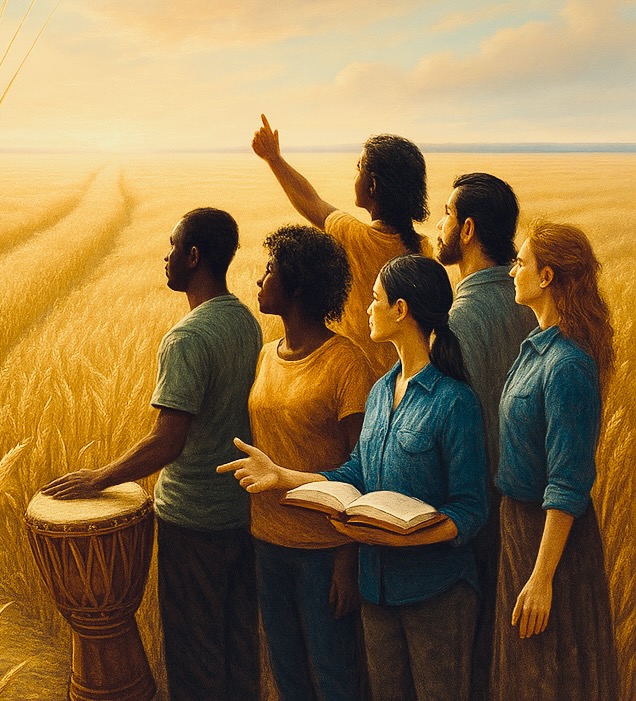
周总理的外交实践体现了一种超越眼前利益的责任感。他深知,今天的选择将塑造明天的世界。他不仅是一位政治家,更是一位和平的播种者——始终为对话留有空间,为后代留下希望。
和平不是软弱,而是最大的力量。和平不是消极的等待,而是积极的建设。和平是一种责任,也是一种深远的智慧。
各位朋友,今天,当世界再次站在选择的十字路口,我们回望周恩来的思想,不是为了停留在历史,而是为了从历史中汲取继续前行的力量。和平思想,不仅属于过去,更属于未来。属于每一个有志于建设一个更好世界的人。
让我们以和平为志,以人民为本,以合作为道,肩负起时代赋予我们的责任,为人类社会的共同繁荣与长久和平,贡献我们的智慧与力量。
让我们以和平为目标,以人民为根本,以合作为途径。让我们肩负起时代的责任,为全人类的共同繁荣与持久和平贡献力量。
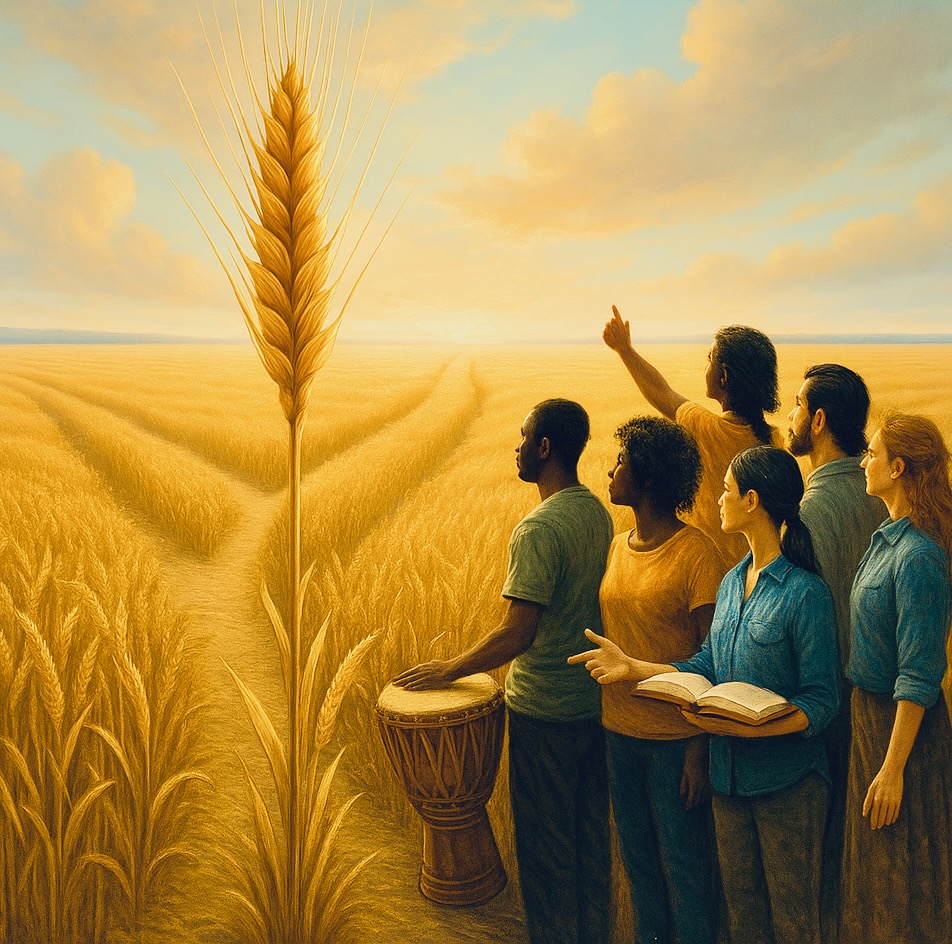
致谢页 / Acknowledgments
感谢各位嘉宾的聆听,
感谢论坛主办方的精心组织,
感谢所有为和平事业默默耕耘的朋友们。
Thanks to all guests for listening.
Thank you to the organizers of the forum for their careful management.
Thank you to all those who have worked quietly for the cause of peace.
“和平是通过对话、相互尊重与共同愿景建立起来的。”
“Peace is built through dialogue, mutual respect, and shared vision.”
Thank you for your attention and commitment to this common journey.
愿和平与我们同在!
May peace be with us!

(PDF)
contact the author
联系作者


